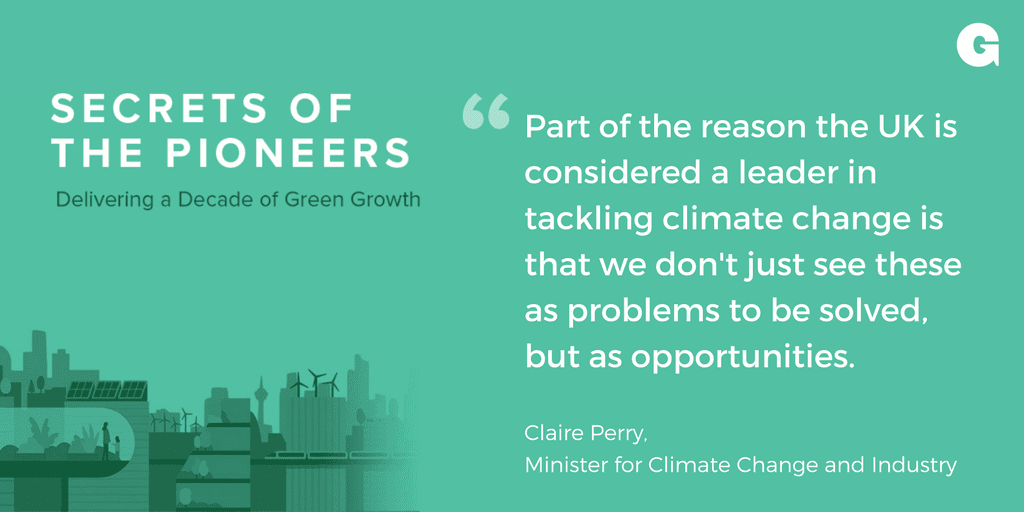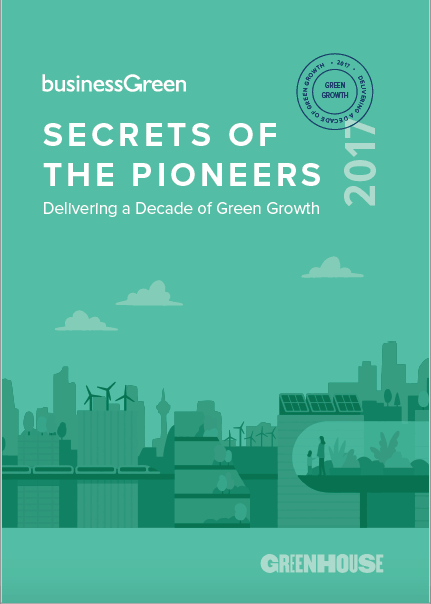Secrets of the Pioneers: Claire Perry MP

We speak to Claire Perry, Minister for Climate Change and Industry at the Department for Business, Energy and Industrial Strategy.
The interview is part of a series for a report, Secrets of Pioneers, Delivering a Decade of Green Growth, which was launched at the BusinessGreen Leaders’ Summit on 9th November 2017.
Elected to Parliament in 2010 to represent the Devizes constituency in Wiltshire, she has previously served as parliamentary private secretary, a government whip, and rail minister.
One of the most notable events during her time as Climate Change Minister has been the launch of the long-awaited Clean Growth Strategy, which sets out over 162 pages the government’s plans to deliver deep decarbonisation across the UK economy.
Where were you in 2007?
In 2007, within six months, I went from being an at-home caregiver involved in various local environmental initiatives to a policy adviser to the then-Shadow Chancellor George Osborne. It was an eventful year, but one that made me especially conscious of the personal and societal opportunity of getting women to return to the workforce after a career break.
Where do you expect to be in 2027?
I have no idea where I will be in 2027. I have never been one for life plans, but I hope to be still doing something I love and doing my best to deliver good results. I do expect it to be an incredibly exciting decade though. We are living through a massive economic transformation driven by decarbonisation.
What is the most important lesson you have learned over the past 10 years?
I have three.
Never say no to exploring an opportunity, no matter how unlikely it seems. Say less and do more. And lastly, love, family, friends and good health are the secret to a happy and productive life.
What is your vision for the green economy in 10 years’ time and what do we need to get us there?
My vision, and that set out recently in the government’s Clean Growth Strategy, is for a green economy that creates opportunities across the whole country – new jobs, technologies and businesses – while cutting costs for consumers and contributing to our climate change targets. To make this happen we need to build on Britain’s strengths in science and innovation – that is why we’ve committed £2.5bn to low-carbon innovation.

What will be the biggest changes from today’s world?
It’s impossible to predict the technological breakthroughs that could change the world over the next decade, but it’s easier to see some of the areas where change is needed.
This year I think we’ve seen a real shift in attitudes to low emission vehicles. With greater innovation from carmakers and continued investment in infrastructure, transport is one area that will look significantly different in 10 years’ time.
What top three sustainability challenges will be top of the agenda in 2027?
There will be big challenges in decarbonising the way we heat our homes, helping heavy industry go carbon-light and ensuring energy is affordable.
But I think that part of the reason the UK is considered a leader in tackling climate change is that we don’t just see these as problems to be solved, but as opportunities.
By focusing on clean growth, we are presented with a win-win situation. We can cut the cost of energy, drive economic growth, create high value jobs right across the UK and improve our quality of life.
Will the world be on course for two degrees?
PwC’s recent Low Carbon Economy Index, published last month, found that the UK and China are the only countries to have reduced their carbon intensity in line with the two-degree goal.
The Paris Agreement marked a clear turning point towards a low-carbon future, but it is clear that current commitments only take us approximately halfway towards the two-degree goal.
One of the main ways Britain can help keep the world on course is by building on our existing strengths in green finance to ensure the investment is there to support countries in meeting their targets.
If you could invest in one clean technology through to 2027 which would it be and why?
There is no magic bullet here. My focus as a government minister is on creating the best possible environment for low carbon innovation and investment.
As we’ve seen with offshore wind, the approach of allowing technologies to compete with one another drives down costs for consumers and has made the UK a global leader in the sector.
What advice would you give to a sustainability professional starting their job today?
I’d like them to read our Clean Growth Strategy!
I recognise that government doesn’t have all the answers and can’t achieve all the changes needed to create a truly green economy by itself.
I’d be really interested to hear the views of young people starting out in the sustainability profession and hopefully to work with some of them. Next year we will introduce Green Great Britain Week to involve as many people as possible in tackling climate change and improving air quality.
Are you optimistic or pessimistic about the future?
I’m optimistic. The UK should be very proud of our record to date.
We were one of the first countries to recognise both the economic and security threats posed by rising sea levels and rising temperatures.
We have followed the guidance provided by that scientific understanding with action.
Since 1990, we have cut emissions by more than 40% while our economy has grown by two thirds over that time. On a per person basis, this means that we have reduced emissions faster than any other G7 nation.
We now have a great opportunity to build on this progress.

This interview is one of more than 20 which make up a report, Secrets of the Pioneers: Delivering a Decade of Green Growth, published on 9th November at the BusinessGreen Leaders’ Summit.
We have already featured several other interviews with leaders from the sector, including Christiana Figueres, former executive secretary of the United Nations Framework Convention on Climate Change, Mike Barry, director of sustainable business at Marks & Spencer, and climate scientist Dr Emily Shuckburgh. These interviews and many others are available on the blog.
This year marks the 10th anniversary of both BusinessGreen and Greenhouse PR, the specialist communications agency which supports businesses, entrepreneurs and campaigners working to create a green economy.
At Greenhouse, we support a wide variety of organisations pioneering new standards of sustainability across multiple sectors. Whether it’s fashion, finance or farming, we’re always on the look-out for new opportunities to reach our clients’ target audiences. If you’ve got a great story and need our help to tell it, we’d love to hear from you.


